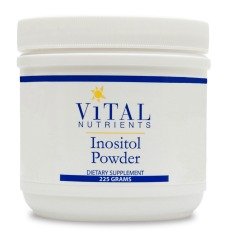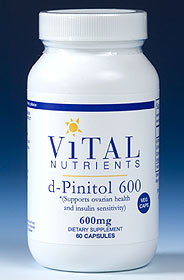11 Ways Inositol Helps You Manage PCOS
Inositol is a nutritional compound that is a "work horse" nutrient for women with PCOS.
Although inositol is widely considered a member of the B-vitamin family, it is technically not a vitamin because the body can manufacture inositol and is not required to get it from the diet.
However, studies from Universite de Sherbrooke in Canada have shown that women with PCOS excrete more inositol than other women do.
Therefore, it may be beneficial to consume supplemental inositol.
We have about 75 medical studies on file suggesting that adequate inositol levels can be helpful for several PCOS-related issues:
- Increases probability of ovulation so that you can become pregnant sooner.
- Improves egg quality and thus increases the probability of a successful pregnancy.
- Help a fat-clogged liver to unclog itself. (Fat clogged livers are a problem for roughly 50% of women with PCOS).
- Can reduce acne and hirsutism (excessive hair growth).
- Can relieve depression and mood disorders.
- Improves appetite balance.
- If you're taking birth control pills to manage PCOS, you will get better results if you also take inositol.
- Helpful for postmenopausal women who have metabolic syndrome (similar to PCOS).
- Reduces insulin resistance and testosterone, which brings all your other hormones into a better balance.
- Reduces risk of gestational diabetes.
- Reduces inflammation.
Recommended Inositol Products
Inositol Powder. Inositol powder is a very cost-effective way to take inositol because it is less expensive per gram than inositol in tablets or capsules. Inositol powder readily dissolves in water and has a slightly sweet taste. If you were to take the same amount as used in a recent study, you would be taking 2,000 - 4,000 mg., or 1/2 - 1 teaspoon a day.
d-Pinitol. This formula contains d-pinitol, which is a form of inositol called "3-O-methyl-D-chiro-inositol". It is thought to be more potent than ordinary inositol. This formula also contains chromium and vitamin D, which are very important for improving insulin function, among other things. This product is more expensive than inositol but provides a more comprehensive and potent approach. 2-4 capsules daily is a suggested dosage.
D-pinitol is a relative of inositol. The distinction between d-pinitol and ordinary inositol is that fewer metabolic steps are required to end up with the final substance required for the second messenger system inside the cell. So, with d-pinitol, the body has to do less work to create the material needed for the second messenger system.
Click here for more information about inositol, its safety and dosages.
Inositol Helps You Ovulate and Regain Hormonal Balance
Two recent studies confirm earlier studies that inositol improves hormone balance and helps to restore normal cycles in women who have polycystic ovarian syndrome.
In the most recent study, from the University of Modena and Reggio Emilia in Italy, 25 overweight PCOS women were given 2 grams of inositol daily for 12 weeks. Menstrual cycles were restored in all women who did not have a normal cycle. Insulin resistance, a primary cause of polycystic ovary syndrome, was reduced.
The authors of the study conclude: "Myo-inositol administration improves reproductive axis functioning in PCOS patients, reducing the hyperinsulinemic state that affects LH secretion."
In the other study at the University of Perugia in Italy, 136 PCOS women took inositol (100 mg., twice daily) for 14 weeks. Another group of PCOS women took placebo pills.
The ovulation frequency was significantly higher in the inositol group (23%) compared with the placebo (13%). The time in which the first ovulation occurred was significantly shorter (23.6 days) compared with 41.8 days for the placebo group. The number of patients failing to ovulate was higher in the placebo group.
The effect of inositol on follicular maturation was rapid. Also, significant weight loss (and leptin reduction) was recorded in the inositol group, whereas in the placebo group had an increase in weight.
The researchers conclude: "These data support a beneficial effect of myo-inositol in women with oligomenorrhea and polycystic ovaries in improving ovarian function."
These and other medical studies suggest that therapeutic doses of inositol would be beneficial for ovulation, reduction of insulin resistance and luteinizing hormone, and possibly for weight loss.
Improves Quality of Your Eggs
An oocyte is a large and complex cell that needs an optimal environment to support its future function. It must be ready to regulate multiple cellular and developmental processes if it is to become fertilized and ultimately grow into a fully-functioning organism.
Some medical research has shown that inositol plays a central role in preparing the oocyte for successful activation at the time of fertilization. An inositol deficiency can disrupt the oocyte's ability to properly mature. Other research has shown that when the ovarian follicle cells that envelop your egg have a good supply of inositol, the quality of the egg is improved.
A new study released recently suggests inositol may be beneficial for improving egg quality in women who have polycystic ovary syndrome.
You need to have good egg quality in order to become pregnant, and in order to avoid a miscarriage. As you may know, PCOS women have a significantly greater risk of miscarriage. In addition we know that egg quality begins to significantly decline for all women after age 35.
In this study, sixty infertile women who had polycystic ovary syndrome were undergoing assisted reproduction treatment. One group was given inositol plus folic acid (anther B-vitamin).The other group was given folic acid alone.
Those who took inositol plus folic acid, but not those taking folic acid alone, had significantly healthier egg cells.
The results of this study indicate that if you are interested in increasing your chances of becoming pregnant and reducing risk of miscarriage, inositol supplementation is advisable. Good egg quality is necessary for a successful pregnancy.
It appears that women with polycystic ovarian syndrome have a need for higher inositol intake because they metabolize and lose it at a greater rate than other women.
Inositol Reduces the Risk of Gestational Diabetes in PCOS Women
Women who have polycystic ovarian syndrome tend to have pregnancy complications. One of those complications is a condition called "gestational diabetes". This condition is when your blood sugar gets too high during pregnancy, most likely due to insulin hormone dysfunction or poor diet. You do not have to be diagnosed as a diabetic in order to have gestational diabetes. There are no typical, obvious symptoms for this disorder except for high blood sugar.
Untreated gestational diabetes may cause problems for your unborn baby, such as abnormal birth weight, blood sugar abnormalities, and possibly a higher risk of developing diabetes later in life.
It's treated with diet, exercise and medications. Is there anything else you could do?
The University of Messina recently published a 3-year study of women with PCOS who became pregnant. One group (44 women) took metformin until the pregnancy occurred. The other group (54 women) took the B-vitamin inositol during their entire pregnancy.
The metformin group was found to have more than twice the risk of developing gestational diabetes compared to the inositol group. In other words, taking inositol cut the risk of gestational diabetes in half compared to not taking inositol.
This is an additional piece of evidence that inositol supplementation should be considered if you have polycystic ovary syndrome, whether you are pregnant or not. It is safe and has no drug-like side effects.
Source: D'Anna R et al, Myo-inositol may prevent gestational diabetes in PCOS women, Gynecol Endocrinol, 2012 Jun; 28(6):440-2.
Related Inositol Articles
- Reduces Acne, Hirsutism, Testosterone, Insulin Resistance
- Lowers Inflammation
- Helps Older Women
- What Is It? Precautions, Dosages
Get Answers to your Questions about
- Fertility
- Weight Control
- Hair Loss
- Stress
- Unwanted Hair
- Acne...and more!
FREE PCOS Report
and Newsletter

Your email is safe with us. We respect your privacy, and you may unsubscribe at any time.
Recent Articles
-
PCOS Long Journey to The Happy End
Apr 30, 18 07:24 PM
Hi Girls, Maybe my story will have one day a good end but I am not there yet. Until I was 31 years old I lived my dream, having lovely husband, good -
PCOS and Miscarriage
Apr 17, 18 04:03 PM
Proper diet and natural supplements can help the body maintain a pregnancy through successful delivery.
-
How to Deal with PCOS and Stress
Apr 04, 18 04:19 PM
Your body has a natural capacity to heal itself if you provide it with the necessary tools.







